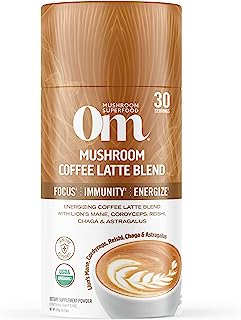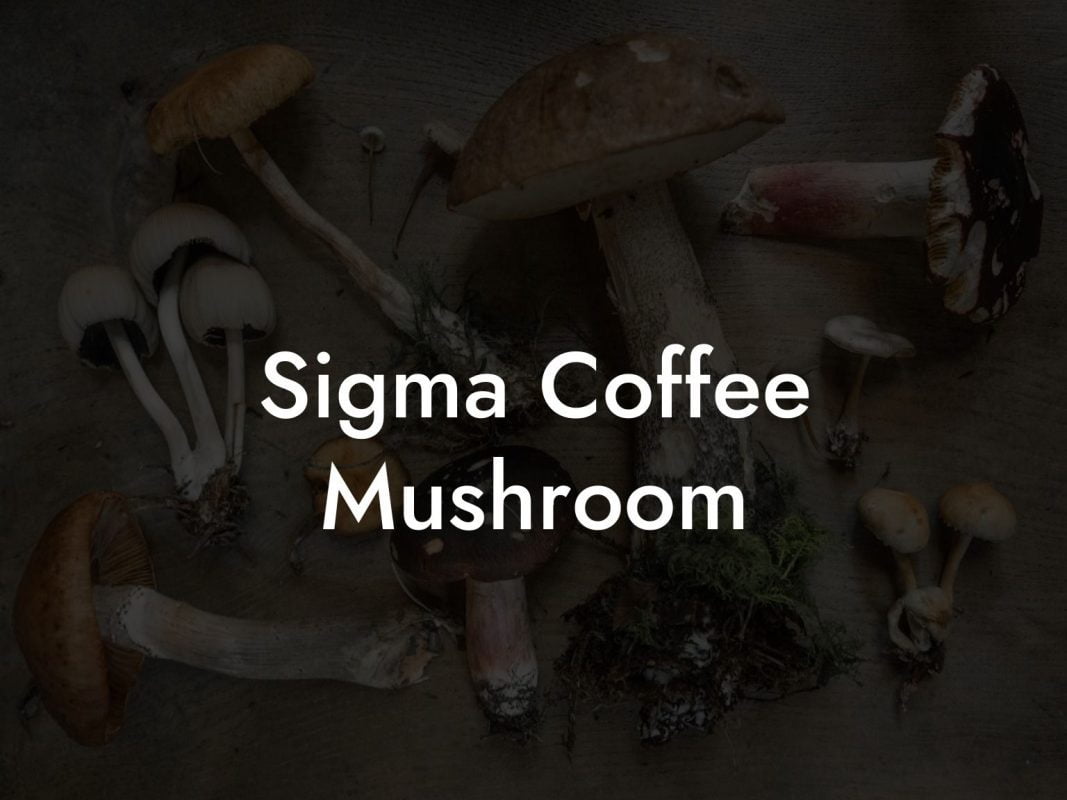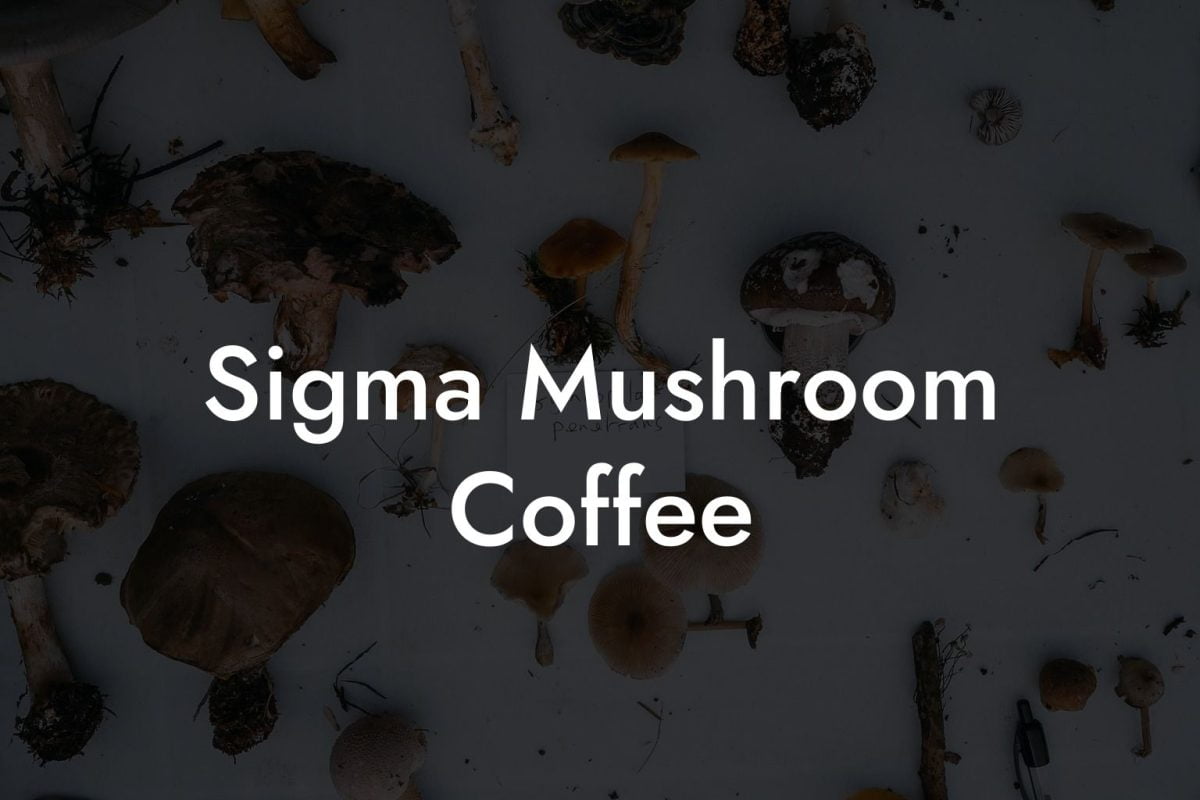Ever wondered if your daily mushroom coffee ritual could be doing more than just giving you that extra boost of energy? Welcome to the ultimate guide on the side effects of mushroom coffee, a deep dive into what happens behind the scenes when you mix your favorite fungi with your beloved brew. Whether you're a Gen-Z go-getter or a millennial hustler, this comprehensive resource is crafted to serve you the lowdown on everything you need to know about mushroom coffee’s benefits, risks, and everything in between. So grab your mug, get comfy, and let’s explore this fascinating blend of superfoods, ancient remedies, and modern caffeine fixes.
Quick Links to Useful Sections
- Understanding Mushroom Coffee: A Kickstart Specialty
- Why Mushroom Coffee is Stealing the Spotlight
- Potential Side Effects of Mushroom Coffee
- 1. Gastrointestinal Upsets
- 2. Allergic Reactions
- 3. Caffeine Sensitivity and Overstimulation
- 4. Interactions with Medications
- 5. Impact on Sleep Patterns
- Dissecting the Science: What’s Really in Your Cup?
- Comparing Mushroom Coffee to Regular Coffee
- Regular Coffee: The Double-Edged Caffeine Sword
- Mushroom Coffee: The Try-Before-You-Commit Cocktail
- Hidden Adaptogens and Their Role in Side Effects
- Mitigating the Side Effects of Mushroom Coffee
- Start Slow and Steady
- Mind Your Timing
- Hydrate, Hydrate, Hydrate
- Listen to Your Body
- Consult with Health Professionals
- Who Should Consider Skipping the Mushroom Coffee?
- Individuals with Known Mushroom Allergies
- Those with Gastrointestinal Sensitivities
- Individuals on Specific Medications
- The Broader Picture: Benefits Versus Risks
- Resources and Community Support: Your Next Steps
- Mushroom Coffee Side Effects: Frequently Asked Questions
- Your Path to a Well-Balanced Coffee Ritual
Understanding Mushroom Coffee: A Kickstart Specialty
Mushroom coffee is not your average cup o’ joe. It’s a sophisticated fusion that combines traditional coffee with medicinal mushrooms like lion’s mane, chaga, reishi, and cordyceps. These mushrooms have been celebrated for centuries in Eastern medicine for their adaptogenic properties, purportedly helping the body adapt to stress and enhancing overall vitality. But, like any potent elixir, mushroom coffee comes with its own set of potential side effects that every coffee aficionado should be mindful of.
At its core, mushroom coffee seeks to offer the best of both worlds: the energizing, aromatic punch of regular coffee complemented by the bioactive compounds in mushrooms. Many enthusiasts tout its benefits, including reduced anxiety, improved cognitive function, and a more balanced energy release. On the flip side, just as coffee has been known to cause jitters and digestive discomfort for some, adding mushrooms to the mix introduces additional variables that might not sit well with everyone.
In today’s fast-paced world, understanding the unique profile of mushroom coffee is essential, not only for those chasing a natural energy boost but also for anyone who wants to be in tune with their body’s signals. Read on as we unravel the layers of this intriguing beverage, exploring both its perks and its pitfalls.
Why Mushroom Coffee is Stealing the Spotlight
In the trendy realm of wellness, mushroom coffee has emerged as a go-to alternative for those who crave a healthier twist on their everyday caffeine fix. But what exactly is driving this surge in popularity? For many, it’s about aligning modern life with ancient wisdom. The mushroom extracts used in these blends are believed to support brain health, boost immunity, and even balance stress hormones, all of which resonate with a generation that values holistic, sustainable living and is in the constant quest for that perfect work-life harmony.
Looking For The Best Mushroom Coffee? You'll Love These:
Beyond its health claims, mushroom coffee is also praised for its smooth taste profile, often described as having less of the bitter aftertaste common to regular coffee. This flavor nuance is particularly appealing to those who have experimented with various coffee blends and are always on the lookout for something new and exciting. The unique taste and multifaceted benefits have made mushroom coffee a darling among social media wellness influencers and health-conscious consumers alike.
While its benefits continue to make headlines, there’s an important conversation that has emerged around the potential side effects of mushroom coffee. Just like any other natural supplement or beverage, what works wonders for one person might not be the perfect match for another. Before you jump on the mushroom coffee bandwagon, let’s break down what could possibly go awry with your new favorite brew.
Potential Side Effects of Mushroom Coffee
When diving into the world of mushroom coffee, it’s crucial to remember that not all superheroes wear capes, and not every mushroom blend is perfect for every body. Despite its wellness credentials, mushroom coffee can sometimes come with side effects that merit a closer look. Here, we break down the most commonly reported issues and explore why they might occur.
1. Gastrointestinal Upsets
For some users, the introduction of mushroom extracts to their coffee routine can trigger mild to moderate gastrointestinal discomfort. This includes symptoms like:
- Stomach cramps
- Nausea
- Bloating
- Diarrhea
These issues may stem from the body’s response to the bioactive compounds within medicinal mushrooms. Some people might find their digestive system isn’t ready to handle the potent adaptogens and polysaccharides that are central to many mushroom supplements.
2. Allergic Reactions
Just like any other natural ingredient, mushrooms can be allergens. Individuals who have sensitivities or allergies to mushrooms might experience various allergic reactions when consuming mushroom coffee. These reactions can range from mild skin rashes and itching to more severe symptoms like respiratory difficulty. If you’re prone to allergies, it’s always wise to consult with your healthcare provider before making the switch to mushroom coffee.
3. Caffeine Sensitivity and Overstimulation
Even though many mushroom coffee blends are designed to moderate the typical caffeine rush, they still contain caffeine, which can cause jitters, restlessness, or anxiety in caffeine-sensitive individuals. The combination of caffeine with bioactive mushrooms might sometimes amplify these effects for people who are particularly sensitive to stimulants. It’s a bit of a double-edged sword: while you might enjoy a smoother energy lift, the residual caffeine can still push your system into overdrive.
4. Interactions with Medications
Another area of concern is the potential for interactions with medications. Some compounds found in medicinal mushrooms can influence how your liver metabolizes drugs. If you’re on medications such as blood thinners, immunosuppressants, or any other chronic condition treatments, you should discuss your mushroom coffee consumption with your healthcare provider to ensure it won’t interfere with your regimen.
5. Impact on Sleep Patterns
While regular coffee is infamous for upending your sleep, the adaptogenic qualities of mushroom extracts might sometimes work in unexpected ways. Depending on the blend and dosage, some users report feeling either oddly energized or too relaxed, both of which can disrupt your usual sleep cycle. If sleep quality is a concern for you, consider timing your mushroom coffee consumption earlier in the day.
These side effects aren’t universal, many people thrive on a daily cup without any issues. However, being aware of potential pitfalls can help you make an informed decision about whether mushroom coffee is the right choice for your lifestyle.
Dissecting the Science: What’s Really in Your Cup?
To truly understand the side effects of mushroom coffee, it helps to know what’s in your cup. Mushroom coffee isn’t just a diluted version of regular coffee; it’s a carefully crafted blend of natural ingredients that work synergistically. Here’s a quick rundown of some of the key components:
- Mushroom Extracts: These are derived from medicinal mushrooms such as reishi, lion’s mane, chaga, and cordyceps. Each carries a unique profile of antioxidants, beta-glucans, and other bioactive compounds that may boost immunity and cognitive function.
- Coffee Beans: Whether it’s Arabica or Robusta, the coffee component is responsible for the caffeine content, which provides that familiar energy lift. However, the bean’s natural acids and oils can also contribute to digestive discomfort if overconsumed.
- Herbal Additives: Some blends incorporate additional herbs or spices, like turmeric or cinnamon, which further complicate the beverage’s profile. While these ingredients have their own set of health benefits, they can also introduce mild side effects when taken in excess or when combined with other compounds.
The unique interplay between these ingredients is what makes mushroom coffee a fascinating drink, and also what necessitates careful attention to dosage and personal tolerance. Researchers are still exploring the full spectrum of benefits and drawbacks, so staying updated with the latest science can keep you fully informed.
Essentially, while the combination of coffee and mushrooms aims to harmonize the jittery nature of caffeine with the calming, adaptogenic properties of fungi, the mix can sometimes tip the scales too far in one direction, leading to either overstimulation or unexpected sedation.
Comparing Mushroom Coffee to Regular Coffee
At first glance, mushroom coffee might seem like a mere fad, an attempt to reinvent a centuries-old beverage by adding a twist of modern wellness. However, comparing it with regular coffee reveals some interesting contrasts that help explain why some people report different side effects.
Regular Coffee: The Double-Edged Caffeine Sword
Traditional coffee is a powerhouse of caffeine, which can improve alertness and concentration but is also known for causing jitters, rapid heart rate, and digestive issues in some individuals. Its high acidity can also lead to stomach discomfort and even acid reflux in sensitive users.
Regular coffee is loved for its robust flavor and quick pick-me-up effect. However, if you find yourself battling an afternoon crash or an overactive heart, you might be experiencing the downside of too much caffeine.
Mushroom Coffee: The Try-Before-You-Commit Cocktail
Mushroom coffee aims to soften the abrupt edge of caffeine by introducing medicinal mushrooms into the mix. The goal is to provide a smoother, more balanced energy boost without the typical highs and lows. For many, this results in a more sustained and steady energy level throughout the day. Yet, it’s important to note that this balance depends heavily on the quality of the ingredients and the ratio of mushrooms to coffee.
While some users celebrate its mellow taste and prolonged energy, others are cautious about the potential for new side effects not typically associated with regular coffee, digestive changes, unusual allergic responses, or even subtle shifts in mood and alertness. The novelty of mushroom coffee means that its long-term effects are still being explored, and individual experiences can vary widely.
The takeaway here is that while mushroom coffee can be an excellent alternative for those seeking a gentler wake-up call, it’s essential to approach it with the same degree of awareness as any other dietary supplement or caffeinated beverage.
Hidden Adaptogens and Their Role in Side Effects
Adaptogens are natural substances that help the body resist various stressors, physical, chemical, or biological. Medicinal mushrooms are renowned adaptogens, and their inclusion in coffee is what makes this beverage uniquely appealing. However, adaptogens also modulate how our systems react to stress and stimulants, which can sometimes lead to side effects when the balance is disrupted.
When you consume mushroom coffee, the adaptogenic compounds can interact with your adrenal system, potentially affecting your hormonal balance. In some cases, this may lead to:
- Unexpected hormonal shifts
- Temporary mood swings
- Altered stress response
Although these effects are usually mild and transient, it’s a reminder that even natural compounds carry a potential risk when they alter the delicate balance of your body’s biochemistry. For those new to adaptogens, it’s important to start with a lower dose and gradually increase your intake while monitoring how your body responds.
For individuals already battling adrenal fatigue or hormone imbalances, consulting a healthcare provider before integrating mushroom coffee into your routine is a wise move. A well-managed introduction of these adaptogens could enhance your overall resilience, but the key is knowing your body and its limits.
Mitigating the Side Effects of Mushroom Coffee
So, you’re intrigued by mushroom coffee but a bit worried about the potential side effects? Fret not, there are several strategies you can adopt to minimize any unwanted reactions. The goal is to enjoy the benefits of this trendy beverage while keeping your body feeling its best.
Start Slow and Steady
Like any new supplement or dietary change, it’s best to begin with small dosages. This allows your body to adjust to the new compounds gradually, reducing the likelihood of overwhelming your system. If you’re new to both coffee and mushrooms in one go, consider mixing a half-and-half blend until you’re comfortable with the effects.
Mind Your Timing
Timing can significantly influence how your body responds. For instance, enjoying mushroom coffee earlier in the day may help prevent sleep disturbances, as your body has time to metabolize the caffeine and adaptogens before bedtime. If you notice any changes in your sleep pattern, experiment with a shorter consumption window in the morning.
Hydrate, Hydrate, Hydrate
Both coffee and mushrooms are known to have diuretic properties. Drinking plenty of water throughout the day can help alleviate some of the gastrointestinal discomfort and ensure your system remains balanced. Hydration is key to offsetting the concentrated nature of any caffeine beverage.
Listen to Your Body
Perhaps the most crucial tip of all: tune in to your body’s signals. If you experience any persistent discomfort, allergic reactions, or unusual symptoms, it might be time to adjust your dosage or switch to an alternative product. Everyone’s physiology is unique, and what works for one person might cause issues for another.
Consult with Health Professionals
When in doubt, consult with a nutritionist or a healthcare provider, especially if you have preexisting conditions or are taking medications. Their expert advice can help you safely incorporate mushroom coffee into your daily routine without jeopardizing your health.
By following these simple guidelines, you can enjoy the myriad benefits of mushroom coffee while keeping any potential side effects firmly in check.
Who Should Consider Skipping the Mushroom Coffee?
Although mushroom coffee is often hailed as a health-boosting marvel, it’s not for everyone. Certain individuals might need to exercise extra caution, or even avoid it altogether, due to its unique composition and the potential side effects.
Individuals with Known Mushroom Allergies
If you’ve had allergic reactions to mushrooms in the past, indulging in mushroom coffee could trigger similar responses. Even if your reaction to culinary mushrooms has been mild, the concentrated extracts in mushroom coffee might cause a stronger reaction. It’s best to avoid or at least proceed under medical supervision.
Those with Gastrointestinal Sensitivities
People who frequently battle stomach cramps, acid reflux, or irritable bowel syndrome (IBS) should approach mushroom coffee with caution. The combination of coffee acids and potent mushroom compounds might exacerbate these conditions, leading to discomfort or digestive upset.
Individuals on Specific Medications
As we touched on earlier, certain bioactive compounds in mushrooms can interfere with the metabolism of medications. If you’re taking drugs that require careful dosage monitoring, especially those processed by your liver, consulting a healthcare provider is essential before adding mushroom coffee to your regimen.
Ultimately, if you have any underlying health issues or concerns, it’s important to prioritize your well-being. Adapting your coffee routine to suit your individual health needs is always the better strategy.
The Broader Picture: Benefits Versus Risks
The debate between the potential benefits and risks of mushroom coffee is similar to many modern wellness trends, it all depends on how you integrate it into your lifestyle. For many, the benefits include:
- More stable energy levels throughout the day
- Enhanced cognitive clarity and focus
- Reduced inflammation and stress due to adaptogenic properties
- A smoother taste profile compared to traditional coffee
However, as with any bioactive supplement, these benefits can come with risk factors if overconsumed or if your body isn’t appropriately attuned to the ingredients. The key is balance and mindfulness, knowing that while mushroom coffee has the potential to enhance your wellness routine, it should be enjoyed as part of a broader, balanced lifestyle.
Remember that science is continually evolving, and what we know about mushroom coffee today might be refined tomorrow. Keeping an open and informed mind is just as crucial as enjoying that green-infused cup each morning.
Resources and Community Support: Your Next Steps
The journey to mastering your mushroom coffee experience doesn’t have to be a solo venture. Countless resources and communities are available to help you navigate both the benefits and the potential side effects of your brew. From in-depth research articles and expert reviews to vibrant online forums and local wellness groups, there’s a wealth of knowledge and support out there.
Online communities on platforms like Reddit, Facebook groups, and wellness blogs are buzzing with discussions about personal experiences, tips on dosage adjustments, and alternative recipes that incorporate mushroom coffee in creative ways. Engaging with these communities can provide you with practical insights and help you tailor your coffee habits to suit your unique needs.
Additionally, many nutritionists and holistic health practitioners now offer consultations that specifically address the integration of adaptogens and natural supplements like mushroom coffee into your diet. Whether you’re seeking guidance on managing side effects or aiming to optimize your beverage for maximum health benefits, professional advice can be a game-changer.
Your next steps are simple: stay informed, share experiences, and don’t be afraid to experiment carefully with your routine. The perfect balance of mushroom coffee’s magic is out there, waiting for you to discover it.
Mushroom Coffee Side Effects: Frequently Asked Questions
In this section, we answer some of the most common questions that pop up when exploring the side effects of mushroom coffee. Whether you’re a seasoned consumer or a curious beginner, these FAQs shed light on the most pressing concerns.
1. What are the common side effects of mushroom coffee?
Many users report mild gastrointestinal issues such as bloating, stomach cramps, or diarrhea. Some may also experience caffeine-related side effects like jitters or trouble sleeping, especially if they are sensitive to stimulants.
2. Can mushroom coffee cause allergic reactions?
Yes, individuals with known mushroom allergies might experience allergic reactions, ranging from skin rashes to respiratory issues. It’s important to start with a small amount if you’re unsure about your tolerance.
3. How does mushroom coffee differ from regular coffee in terms of side effects?
While both beverages contain caffeine, mushroom coffee includes additional bioactive compounds from medicinal mushrooms. These compounds can sometimes lead to digestive discomfort or hormonal shifts, although many find the overall effect to be smoother.
4. Are there any long-term side effects linked to mushroom coffee?
Long-term research is still ongoing. Currently, most side effects are reported as mild and transient. However, it’s important to pay attention to how your body responds over time and adjust your intake if any issues persist.
5. Can mushroom coffee interfere with medications?
Some compounds in medicinal mushrooms can affect drug metabolism. If you’re taking any prescription medications, especially those processed by your liver, consult your healthcare provider before incorporating mushroom coffee into your routine.
6. How much mushroom coffee is safe to drink daily?
The optimal dosage can vary from person to person. Many experts recommend starting with one cup per day and gradually increasing if your body responds well. Always consider your caffeine tolerance and any preexisting conditions.
7. What should I do if I experience side effects after drinking mushroom coffee?
If you notice any adverse effects such as severe gastrointestinal discomfort or allergic reactions, stop consuming the product and consult your healthcare professional for advice.
8. Does mushroom coffee affect sleep patterns?
For some individuals, the caffeine content can interfere with sleep if consumed too late in the day. It’s best to enjoy your cup in the morning or early afternoon.
9. Are there any interactions between mushroom coffee and energy supplements?
Since both products may contain stimulants and adaptogens, combining them can sometimes amplify the effects. It’s best to monitor your response closely and adjust accordingly.
10. Where can I learn more about mushroom coffee side effects and benefits?
There are plenty of reliable resources online, including scientific studies, nutrition blogs, and user communities dedicated to adaptogens and functional beverages. Engaging with these sources can keep you updated on the latest findings.
Your Path to a Well-Balanced Coffee Ritual
The journey to understanding mushroom coffee, with all its exciting benefits and potential side effects, is ultimately about balance and mindfulness. While mushroom coffee holds the promise of a more balanced energy boost and many path-breaking health benefits, ensuring that you listen to your body remains paramount.
The key takeaway is to celebrate your curiosity and embrace informed experimentation. Whether you’re a seasoned coffee lover or just stepping into the realm of functional beverages, it’s important to enjoy every sip while remaining aware of how your body reacts. Customize your approach by paying attention to dosage, timing, hydration, and even combining your knowledge with expert advice and community insights.
With the right balance, mushroom coffee can blend seamlessly into a wellness routine that supports both your physical and mental health. As research evolves and more insights emerge, staying open to learning and adapting your habits will ensure that you maximize the benefits while gracefully sidestepping potential side effects.
So here’s to a journey of experimentation, mindful sipping, and an empowered approach to your daily coffee ritual. Your body, mind, and taste buds will thank you!
Looking For The Best Mushroom Coffee? You'll Love These:
Useful Interruption: Dive deeper into the world of Mushroom Coffee with our most popular sections. If there is anything you think is missing or anything you would love for us to write about, just give us a shout.
- Mushroom Coffee Equipment & Product Reviews
- Mushroom Coffee Recipes & Creative Variations
- Mushroom Coffee Guides & Troubleshooting
- Mushroom Coffee Brewing & Preparation Techniques
- Model Rocket Advanced Rocketry & Innovations
- Mushroom Coffee Fundamentals
- Model Rocket Equipment Reviews & Digital Tools
- Mushroom Coffee Health Benefits & Wellness
- Mushroom Coffee Mycology & Scientific Insights
- Mushroom Coffee Community, Lifestyle & Engagement
I tried mushroom coffee this morning and told my friend, "This brew is spore-tacular!" He shot back, "Guess that's why it's such a cap-tivating way to kickstart your day!"















